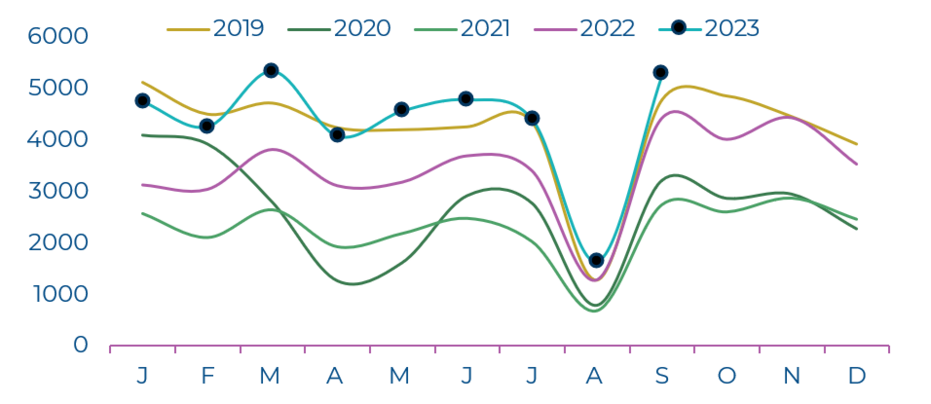Explore the 2023 survey on corporate payment behavior in France, revealing longer and more frequent payment delays, impacting small companies.
In 2023, 97% of French companies have offered payment terms to their customers, with an average timeframe of 48 days.
Despite this, 82% of companies have recorded payments delays by their clients over the past 12 months. The majority stated that late payments were occurring more frequently, and for longer periods than last year. The deterioration in corporate payment habits is echoed in insolvency numbers, with an undisputed increase observed since the start of the year that has even overshot pre-Covid levels.
Payment terms1: a well-entrenched practice
Extending payment terms is a well-established practice in France: 97% of companies offer them to their clients irrespective of the sector and the size of the company. The average timeframe works out to 48 days, which is significantly higher than terms offered in Germany (32 days) or even in Poland (46 days), but still much lower than those offered in China (81 days) and the rest of Asia (66 days).
Proof of the widespread nature of this practice in France is that although very small businesses are relatively less inclined to grant payment terms, 95% of them in fact do so. However, the payment terms are shorter. For example, 35% of them offer payment terms of less than one month, compared with around 10% for other company sizes.
Payment delays: the situation is becoming strained, VSEs and SMEs hard hit
82% of companies have experienced payment delays in 2023. It is more frequent than in Poland (61% of companies), Germany (76%) and Asia (57%), where payment terms are longer, but delays are less frequent.
The size of the company is an important factor affecting payment delays. 70% of VSEs and SMEs declared that payment delays had increased, versus “only” 53% of intermediate sized companies and large companies. Furthermore, most of VSEs and SMEs reported more frequent payment delays than in 2022. 54% of VSEs experienced payment delays of more than a month and almost 20% went as far as to cite payment delays of over two months. As such, the average payment delay stands at 42 days for VSEs, compared with 38 days for SMEs and “only” 26 days for larger companies. The results are even more worrying as half of VSEs stated that late payments have a “very important” or “critical” impact on their cash situation.
Among the reasons cited, 27% of respondents cited their clients’ financial difficulties as grounds for payments delays, some 41% of them suspect that clients are deliberately holding back for cash flow management purposes.
Insolvencies in France are on the rise
After remaining particularly low until mid-2022, the number of corporate insolvencies returned to its pre-Covid level at the end of last year. 39 098 insolvencies were recorded over the first 9 months of the year, up 34% on 2022 and 4.5% higher than in 2019.
This dynamic affects all sectors. Insolvencies were driven by entities generating revenue of less than €250,000 (+8% compared with the January-September 2019 period) and those generating revenue of more than €10 million have also recorded significantly more insolvencies than in pre-pandemic times (+8%).
This trend is set to continue over the next few quarters, with margins and cash flow under pressure due to restrictive financing conditions, more limited demand and rising costs.
Monthly corporate insolvencies


Deteriorating economic outlook and multiple risks
90% of the companies surveyed expect economic conditions to worsen or, at best, for activity to remain stable in France and worldwide, expectation shared by companies of all sizes.
Despite the persistently limited growth prospects for France and the European Union in 2024, these two markets remain widely favoured by exporting companies (72% for France and 60% for EU) which see them as the best opportunities for their business next year.
Amid an uncertain global geopolitical backdrop conducive to nearshoring2 and friendshoring3, 12% of companies surveyed reported having already relocated at least some of their activity. 84% of companies that have relocated or intend to relocate part of their activity plan to do so in France.
1 Payment terms - period of time between the moment a client purchases a product or a service and the time payment becomes due.
2 Nearshoring - relocation of economic activity to a country that is geographically close.
3 Friendshoring - relocation of economic activity to a country that is a geopolitical ally.

